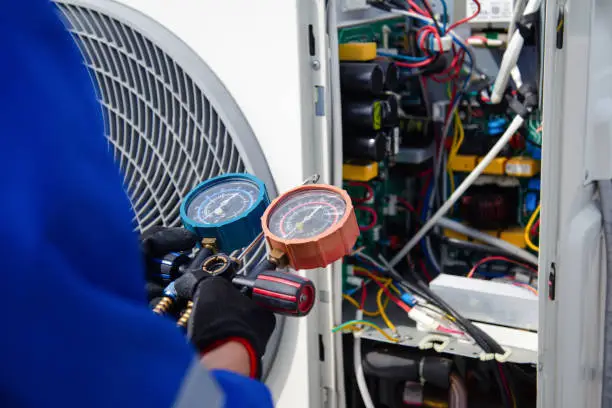When your HVAC system starts acting up—maybe it’s making weird noises, struggling to keep your home cozy, or sending your energy bills skyrocketing—you’re faced with a crucial question: Should I repair or replace my HVAC system?
It’s not always an easy choice to be honest. The right answer can save you money, boost your home’s comfort, and avoid surprise breakdowns. Let’s break it down so you can confidently decide what’s best for your home.
How do You Know If Your HVAC System Needs Repair or Replacement
Before debating repair vs. replacement, watch for these telltale signs your HVAC system might be in trouble:
- Uneven temperatures or inconsistent airflow
- Rising energy bills without added usage
- Frequent breakdowns or repairs piling up
- Strange sounds, foul odors, or excess dust
- Short cycling (turning on and off too often)
- Poor indoor air quality and humidity issues
If any of these hit close to home, it’s time for a professional HVAC inspection.
Should You Repair Your HVAC System? Here’s When It Makes Sense
Repairs can be a quick and cost-effective fix—especially if your system isn’t ancient. Here’s when repairing makes sense:
1. Your HVAC System is Less Than 10 Years Old
A well-maintained system can last 12-15 years. If yours is on the younger side, a repair is usually a savvy choice that extends its life and keeps it running efficiently.
2. Repair Costs Are Less Than 50% of Replacement
The classic “50% rule” helps simplify the math: if fixing it costs less than half a new system’s price, repair away!
3. The Problem is Localized and Minor
Sometimes a faulty thermostat, clogged filter, or broken capacitor is all that’s wrong. Fixing small components can restore your system without a full overhaul.
When Is It Time to Replace Your HVAC System?
Sometimes, the writing’s on the wall (or the thermostat). Consider replacement if:
1. Your System is Older Than 10-15 Years
Older HVAC units tend to lose efficiency, break down more often, and can’t keep up with modern energy standards. New systems come with high-efficiency ratings that reduce your carbon footprint and slash energy bills.
2. You’re Spending More on Repairs Than It’s Worth
Frequent, costly repairs are a money pit. Investing in a new system can save you headaches and cash down the line.
3. Energy Bills are Rising Steadily
An aging HVAC system guzzles energy inefficiently. Upgrading to an energy-efficient HVAC system can dramatically reduce your monthly costs.
4. You Want Better Comfort and Indoor Air Quality
Newer systems offer advanced filtration, humidity control, and smart tech integrations that older units simply can’t match.
Bonus: The Importance of Energy Efficiency
Modern HVAC systems are designed to meet or exceed ENERGY STAR standards, which means they use less power and work smarter. This not only helps the environment but also puts money back in your pocket. Plus, many local utility companies offer rebates for installing energy-efficient units—free money is always a win!
The Decision Cheat Sheet: Repair or Replace?
| Question | Repair | Replace |
|---|---|---|
| System age under 10 years? | ✅ Repair | ❌ Replace not necessary |
| Repair cost < 50% of new system? | ✅ Repair | ❌ Consider replacement |
| Frequent, expensive breakdowns? | ❌ Replace | ✅ Replace |
| Rising energy bills? | ❌ Replace | ✅ Replace |
| Desire improved comfort & air quality? | ❌ Replace | ✅ Replace |
Pro Tip: Regular Maintenance Extends the Life of Your HVAC System
Whether you repair or replace, regular HVAC maintenance is key. Changing filters, cleaning coils, and scheduling tune-ups keep your system efficient and prevent costly repairs.
When You’re Ready, Call the Experts
Not sure what your system needs? Don’t stress! Our licensed, insured HVAC contractors at Commercialand Residential Contractors provide honest assessments, upfront pricing, and expert advice tailored to your home and budget.
📞 Contact us today for a free consultation and let’s get your home comfortable again.

